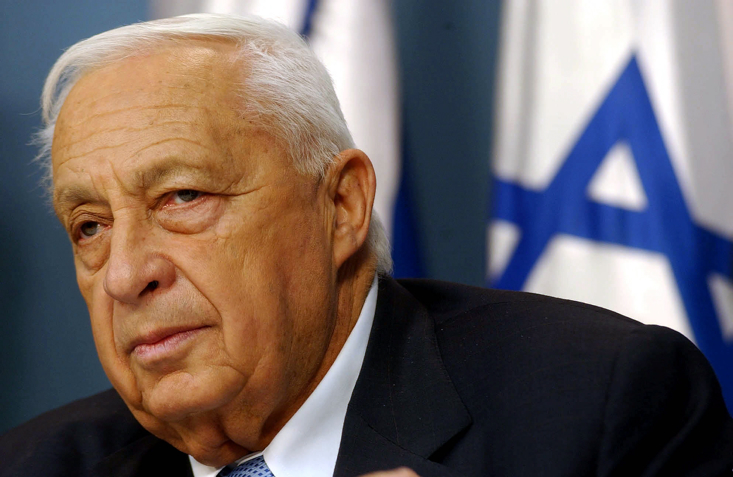How the Big Papers Remember Ariel Sharon
Jan 13 2014 / 9:12 pm
By Peter Hart.
FAIR, January 13, 2014 – Reading the pieces in the Sunday editions of the New York Times and the Washington Post (3/12/14) about the death of former Israeli Prime Minister Ariel Sharon, one gets the sense that reporters were aware of some of Sharon’s bloodiest history–but mostly kept that out of their accounts of his life.
In the Washington Post (1/12/14), readers were told in the very first sentence that Sharon “epitomized the country’s warrior past even as he sought to become the architect of a peaceful future.” Alluding to Sharon’s concept of peace is curious, given his history. But that history was elided, as when the Post‘s Glenn Frankel explained this:
Mr. Sharon was recalled to create and command Unit 101, which was tasked with conducting commando operations against Palestinian guerrillas. It was there that he first won recognition for his brutally effective tactics and retaliatory raids.
What “brutally effective tactics” the Post has in mind isn’t clear, but that unit is perhaps best known for a 1953 massacre in the Jordanian village of Qibya, when Sharon’s unit killed dozens of women and children. The Post‘s limited view was on display again when it explained that Sharon
earned the title “the Bulldozer” in the early 1970s for rooting out Palestinian resistance in the refugee camps of the Gaza Strip in part by plowing open lanes to allow Israeli armored vehicles to move through densely populated civilian zones.
Destroying homes in a refugee camp to make for tanks is not “rooting out Palestinian resistance.”
The 1982 invasion of Lebanon, which was launched when Sharon was minister of Defense, was dubbed “ambitious” by the Post, which added that it “eventually succeeded in expelling Arafat and his fighters to Tunis.” One of the most harrowing incidents of the war, the massacre in Lebanon’s Sabra and Shatila Palestinian refugee camps, was essentially explained away:
Mr. Sharon was forced to resign after an independent Israeli judicial commission ruled that he bore indirect responsibility for failing to prevent a massacre of Palestinian refugees at the Sabra and Shatila camps south of Beirut by Israel’s Lebanese Christian militia allies. He later sued for libel and won a retraction and settlement from Time magazine for an article that claimed he had sanctioned the massacre in advance.
That is a remarkably charitable description of a brutal massacre of as many as 3,500 civilians. An official Israeli investigation known as the Kahan Commission found that Sharon had personally decided to send right-wing Christian paramilitary forces, known as the Phalangist militias, into Palestinian refugee camps immediately after Palestinians had been (falsely) accused of assassinating the Lebanese President-elect Bachir Gemayel, a Phalangist leader. The fact “that the Phalangists were liable to commit atrocities…did not concern [Sharon] in the least,” the Commission found (Human Rights Watch, 1/11/14).
After the massacre began, Israel assisted the killing by firing flares over the camp to provide illumination for the Phalangists (New York Times, 9/26/82). Recently declassified Israeli documents (New York Times, 9/17/12) show that when US officials pressed Sharon to order the militias out of the camps, he retorted, “If you don’t want the Lebanese to kill them, we will kill them.”
The libel suit against Time involved the magazine’s report that an annex to the Kahan report said that Sharon had privately urged the Phalangists to seek revenge–a claim that was not, in fact, part of the report. A US court found that Time had not libeled Sharon, but when he filed another suit against the magazine in Israel, where libel laws favor plaintiffs, it settled the case (Philadelphia Inquirer, 1/23/86). To present this outcome as though it absolves Sharon is a distortion of history.
Thousands of Lebanese civilians died in the invasion of Lebanon, though you’d have a hard time knowing that if you read the Washington Post.
The lengthy obituary in the New York Times (1/12/14) by Ethan Bronner filled in some of what was missing from the Post. The Times mentions the Unit 101 raid that the Post omitted. But like the Post, the Times tried to place emphasis on Sharon’s supposed interest in peace; the headline refers to Sharon as an “Israeli Hawk Who Sought Peace on His Terms.” When discussing the Sabra and Shatila massacres, Bronner wrote:
He was dismissed as washed up in 1983 when he was forced to resign as defense minister after an official committee charged him with “indirect responsibility” for a Lebanese massacre of hundreds of Palestinians the previous year.
Mr. Sharon survived that humiliation and remained politically active enough to take command of his rudderless Likud Party after a 1999 rout by Labor.
Given the scale of killing he bore responsibility for, it is obscene to refer to the “humiliation” of Sharon.
Apart from this bloody record that the Times and Post mostly whitewashed, another key part of Sharon’s legacy are the illegal settlements that even US politicians recognize as an obstacle to any meaningful solution to the Israel/Palestine conflict. Given that, the attempts to portray Sharon as a peacemaker ring all the more hollow.
So would critics of Sharon’s legacy ever get a voice? Articles the next day provided an answer. In the Post (1/13/14), a piece headlined (in the print edition) “To Evicted Settlers, Sharon Was No Hero” mostly conveyed the bitter feelings of settlers who felt betrayed by Sharon over his decision to remove illegal colonial settlements in the Gaza Strip. The article started by noting that while “thousands paid tribute” to Sharon, “there were other voices to be heard.” That led to a brief discussion of young Palestinians burning his photograph, leaders of the Palestinian political movements Fatah and Hamas, a “leftist historian” and also a “human rights activist.” Those voices, heard in passing, were merely a set-up for the words of angry settlers, which occupied the rest of the article.
“Praise and Criticism” for Sharon, the New York Times reports–but the criticism is almost entirely from the right.
In the New York Times (1/13/14), readers saw the headline “Praise and Criticism as Sharon’s Body Lies in State.” But the criticism comes from right-wing settlers–e.g., “A Belgian businessman with a velvet skullcap who despised Mr. Sharon’s late-in-life moves regarding the Palestinians said he had come ‘to make sure he’s dead.'”
Were there other criticisms to be heard? The Times says that “Palestinian news media reported” that some burned pictures of Sharon, and that human rights groups “denounced Mr. Sharon as a war criminal.” They were the exception:
But most Israelis mourned Mr. Sharon as a man whose imprint on their nation had been indelible, and one of the last of its founding generation of fighters and farmers.
As is often the case, there are more thorough examinations available in the independent media. Max Blumenthal’s obituary in the Nation (1/11/14) is one such piece, as is the discussion on Democracy Now! (1/13/14) with Noam Chomsky and Rashid Khalidi.
In that interview, Chomsky says:
There is a convention that you’re not supposed to speak ill of the recently dead, which unfortunately imposes a kind of vow of silence because there’s nothing else to say–there’s nothing good to say…. He was a brutal killer.



